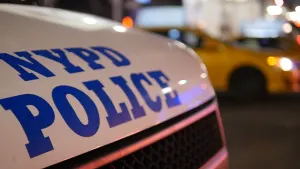State Homeland Security office releases analysis of potential domestic terror threats against NJ
A New Jersey Office of Homeland Security report says that the state will continue to face threats from white supremacists, anarchists and militia groups in 2021.
•
Mar 25, 2021, 10:53 PM
•
Updated 1,674 days ago
Share:
More Stories
1:10

Man wanted for shooting 2 teens after near-collision in The Bronx
41m ago0:30

Man wanted for Bronx Terminal Market stabbing
11h ago1:50

Body of Norwood woman found after neighbors report foul odor
20h ago2:32

'She was bleeding everywhere.' 12-year-old girl clings to life after Bronx domestic stabbing
yesterday0:25

Woman found dead in Norwood apartment during wellness check
yesterday1:22

NYPD: 4 men wanted for robbery at Fordham discount store
yesterday1:10

Man wanted for shooting 2 teens after near-collision in The Bronx
41m ago0:30

Man wanted for Bronx Terminal Market stabbing
11h ago1:50

Body of Norwood woman found after neighbors report foul odor
20h ago2:32

'She was bleeding everywhere.' 12-year-old girl clings to life after Bronx domestic stabbing
yesterday0:25

Woman found dead in Norwood apartment during wellness check
yesterday1:22

NYPD: 4 men wanted for robbery at Fordham discount store
yesterdayA New Jersey Office of Homeland Security report says that the state will continue to face threats from white supremacists, anarchists and militia groups in 2021.
“It’s almost this new era of extremism, from a domestic perspective,” says Director Jared Maples.
Maples says that extremist groups from the right and the left will continue to organize this year and possibly commit acts of violence in the state. The rising threat is fueled by false narratives on social media and mistrust from the COVID-19 pandemic.
“The pandemic left an environment or led to an environment of misinformation and disinformation that was just unprecedented,” Maples says. “So, something that probably wouldn’t have got out to the masses before - a narrative whether it be from a foreign government or domestic extremist - that’s getting out to millions immediately.”
The four-page unclassified report released this week says lone wolf domestic extremists are a persistent threat - whether those extremists are inspired by Islamist groups like ISIS and al Qaeda, or the ideology of white supremacy. In 2020, anarchist extremists engaged in street-level violence against law enforcement nationwide, including the May 31 riot in downtown Trenton.
“We also had several actors who aligned with that ideology who were arrested in Philadelphia,” Maples says.
The report also states that militia extremists nationwide will likely focus on attacking government representatives, like the deadly insurrection at the United States Capitol on Jan. 6.
“I obviously can’t get too far into the specifics, but we had threats, several threats we pursued and wanted to get ahead of, against elected officials here,” Maples says.
White, racially motivated extremists like the New Jersey European Heritage Association, will focus on propaganda and recruiting. But a “lone wolf” could engage in isolated attacks, according to the report. What’s new, Maples says, is like the Capitol Hill attack, different extremist groups are working in concert against shared enemies like the government and law enforcement.
“That’s something we’ve talked about and referred to as ‘the witch’s brew.’ You see this ideological collision that’s happening,” says Maples.
A longer, classified version of the Homeland Security report will be distributed to law enforcement and policymakers.
More from News 12
1:10

Bronx residents hit the polls for early voting
1:46

South Bronx climate advocates urge an increase in park budgets ahead of mayoral election
1:39

NY Attorney General Letitia James pleads not guilty in mortgage fraud case pushed by Trump
0:42

House minority leader Jeffries endorses Mamdani for NYC mayor
1:51

Conservative Party chair expects Stefanik to run for NY governor next month
1:50
